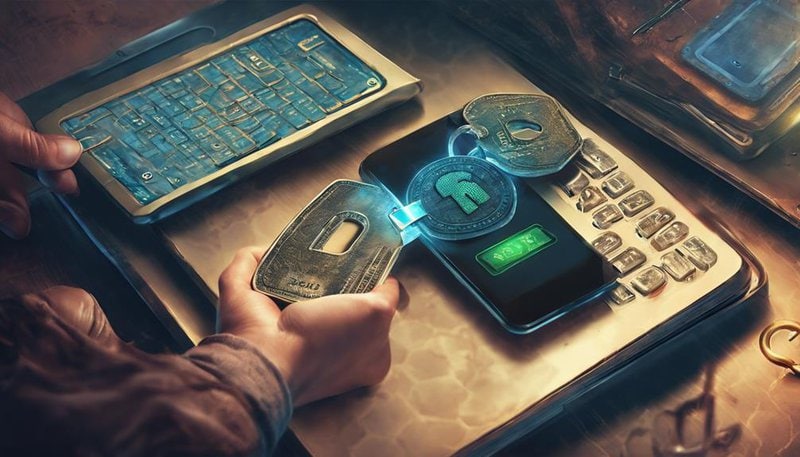How to Ensure the Safety of Your Crypto During Peer-to-Peer Transactions

How to Ensure the Safety of Your Crypto During Peer-to-Peer Transactions:
Secure platforms and two-factor authentication are essential measures to protect your digital assets. Conducting due diligence on counterparties before engaging in transactions can help mitigate risks. Utilizing encryption protocols adds an extra layer of security to your peer-to-peer dealings. Additionally, consider using escrow services to ensure a safe and successful exchange of cryptocurrencies.
Understanding Peer-to-Peer Transactions
To grasp the essence of peer-to-peer transactions, envision a direct exchange of digital assets between individuals without the need for intermediaries. In this setup, understanding risks and identifying scams is paramount. Risks in peer-to-peer transactions can range from encountering fraudulent sellers to falling victim to phishing schemes. It's crucial to exercise caution and conduct thorough research before engaging in any transaction.
When it comes to identifying scams, paying attention to red flags is key. Be wary of deals that sound too good to be true or sellers who pressure you to act quickly without giving you time to verify the transaction details. Additionally, always use reputable platforms with built-in security features to minimize the risk of falling prey to scams.
Choosing Secure Platforms
When selecting a secure platform for your crypto transactions, consider the security features it offers, the thoroughness of its user verification process, and the strength of its privacy and encryption measures.
These aspects are crucial in safeguarding your assets and personal information while engaging in peer-to-peer transactions.
Prioritize platforms that excel in these areas to ensure a secure and smooth crypto trading experience.
Platform Security Features
Selecting a secure platform with robust security features is essential for safeguarding your crypto transactions in peer-to-peer settings. When choosing a platform, prioritize those with top-notch account protection measures and stringent security protocols.
Look for platforms that offer two-factor authentication, encryption of sensitive data, and regular security audits to ensure your assets are well-protected. Opt for platforms with a track record of security excellence and a commitment to staying ahead of potential threats.
User Verification Process
For enhanced security in your peer-to-peer crypto transactions, prioritize platforms with a rigorous user verification process. Ensuring identity verification and fraud prevention mechanisms are in place is crucial to protect your assets.
Look for platforms that require document authentication as part of their verification process. This extra step adds a layer of security by confirming the authenticity of user-provided information.
A thorough verification process not only safeguards your transactions but also reduces the risk of potential fraudulent activities. By choosing platforms that prioritize these security measures, you can have more peace of mind when engaging in peer-to-peer crypto transactions.
Privacy and Encryption
To ensure the utmost security in your peer-to-peer crypto transactions, prioritize platforms that emphasize privacy and encryption as fundamental components of their security measures.
When selecting a platform, prioritize those that offer robust data protection to safeguard your sensitive information from unauthorized access.
Look for features like end-to-end encryption to ensure your communication security is maintained throughout the transaction process.
Platforms that prioritize privacy and encryption create a secure environment for your crypto transactions, giving you peace of mind knowing that your data is protected.
Implementing Two-Factor Authentication
Consider incorporating two-factor authentication into your crypto transactions for added security and peace of mind. Two-factor authentication provides an extra layer of protection, making it more difficult for unauthorized individuals to access your accounts or execute transactions.
Here are some ways you can enhance your security through two-factor authentication:
- Multi-Device Authentication: Utilize the option to authenticate your transactions across multiple devices. This ensures that you have control over every access point to your account.
- Biometric Verification: Embrace the use of biometric data such as fingerprint or facial recognition to confirm your identity, adding a personalized and secure touch to your transactions.
- Time-Based Passcodes and SMS Verification: Incorporate time-sensitive codes and SMS verification to ensure that only you, with access to your designated device, can complete transactions securely.
Conducting Due Diligence on Counterparties

Before engaging in peer-to-peer crypto transactions, it's crucial to verify the counterparty's identity and thoroughly check their transaction history.
Conducting due diligence on your counterparties can help you assess the risks involved and make informed decisions about whom to transact with.
Verify Counterparty's Identity
Verify the identity of your counterparty by conducting thorough due diligence to ensure the safety and security of your peer-to-peer transactions. When verifying the identity of your counterparty, consider the following:
- Identity Verification: Utilize secure communication channels to exchange information and verify identities securely.
- Trustworthiness Assessment: Evaluate the trustworthiness of the counterparty through background research and references.
- Authentication Protocols: Implement robust authentication protocols to confirm the legitimacy of the parties involved in the transaction.
Check Transaction History
To further safeguard your peer-to-peer transactions, delve into the past by scrutinizing the transaction history of your counterparties. Monitoring activity is crucial in protecting funds during crypto transactions.
Look for any red flags such as frequent large transactions or suspicious patterns that could indicate potential risks. Utilize transaction alerts provided by platforms to stay informed about any unusual behavior.
By actively monitoring transaction histories, you can prevent fraud and ensure a secure trading environment. Remember, taking the time to review these details can make a significant difference in the safety of your crypto assets.
Stay vigilant, stay informed, and prioritize due diligence to keep your funds secure in peer-to-peer transactions.
Using Escrow Services
For secure peer-to-peer transactions, utilizing reputable escrow services is paramount. When engaging in crypto transactions, especially with unfamiliar parties, escrow services offer a layer of protection for both buyers and sellers.
Here are some essential points to consider:
- Escrow Benefits and Risks: Escrow services provide a secure way to conduct transactions by holding the cryptocurrency in trust until the terms of the deal are met. This helps prevent fraud and ensures that both parties fulfill their obligations. However, there are risks involved, such as the potential for scams where the escrow service itself isn't legitimate.
- Escrow Best Practices: Choose a well-known and trusted escrow service with a proven track record. Verify the escrow service's reputation through online reviews and forums. Clearly outline the terms of the transaction and ensure they're agreed upon by all parties before funds are released.
Encrypting Your Wallet

When safeguarding your crypto assets in peer-to-peer transactions, the first step to fortifying your security is by encrypting your wallet. Encrypting your wallet involves securing it with a passphrase, which acts as a key to access your funds. This passphrase should be unique, complex, and kept confidential. By encrypting your wallet, you add an extra layer of protection against unauthorized access and potential breaches.
Consider using hardware wallets for enhanced security. Hardware wallets are physical devices that store your cryptocurrency offline, making them less vulnerable to online threats like hacking or malware. These wallets provide a secure environment for your crypto assets and require physical interaction to authorize transactions, further safeguarding your funds.
Creating Strong Passwords
Secure your crypto assets by crafting robust passwords to fortify your digital defenses against potential threats. When it comes to password management, it's crucial to follow best practices to enhance the security of your accounts. Consider implementing biometric verification where possible to add an extra layer of protection.
To strengthen your passwords effectively, keep the following tips in mind:
- Use a mix of uppercase and lowercase letters, numbers, and special characters: Creating complex passwords makes it harder for attackers to guess them.
- Implement multi-factor authentication (MFA) wherever feasible: MFA provides an additional security barrier by requiring users to verify their identity through multiple methods.
- Regularly update and change your passwords: Periodically changing your passwords reduces the risk of unauthorized access to your accounts and crypto assets.
Keeping Your Private Keys Secure

Safeguarding the confidentiality of your private keys is paramount in ensuring the security of your crypto assets. To achieve this, consider utilizing hardware wallets for secure storage. These physical devices store your private keys offline, making them less vulnerable to online hacking attempts. Hardware wallets provide an extra layer of protection by keeping your keys isolated from internet-connected devices.
Another strategy to enhance the security of your private keys is to explore multi-signature wallets and effective key management. Multi-sig wallets require multiple private keys to authorize a transaction, making it more complex for unauthorized access. By splitting the responsibility for key management among different parties, you reduce the risk of a single point of failure compromising your assets.
Regularly Updating Security Measures
To fortify the protection of your crypto assets, it's imperative to consistently update and enhance your security measures. Regularly updating security measures is crucial in safeguarding your investments and ensuring peace of mind.
Here are key actions you should take to keep your crypto secure:
- Security audits: Conduct regular security audits to identify any vulnerabilities in your system and address them promptly. This proactive approach can help prevent potential breaches and unauthorized access to your crypto assets.
- Risk assessment: Perform regular risk assessments to evaluate the security of your crypto holdings. By understanding the risks involved, you can implement targeted security measures to mitigate potential threats effectively.
- Data protection and Vulnerability scanning: Implement robust data protection measures to safeguard your sensitive information. Regularly conduct vulnerability scanning to detect and address any weaknesses in your security infrastructure.
Frequently Asked Questions
How Can I Protect My Crypto Assets From Potential Scams or Fraud in Peer-To-Peer Transactions?
To protect your crypto assets from scams in peer-to-peer transactions, focus on risk management. Prioritize security audits to ensure the safety of your investments. Stay vigilant and use reputable platforms to minimize potential fraud risks.
Are There Any Specific Red Flags to Watch Out for When Choosing a Secure Platform for Peer-To-Peer Transactions?
When evaluating a platform for peer-to-peer transactions, scrutinize security features and transaction history. Red flags like lack of encryption, suspicious activity, or negative reviews are warning signs. Conduct a thorough risk assessment before engaging.
How Can I Verify the Legitimacy of a Counterparty Before Engaging in a Peer-To-Peer Transaction?
Before engaging in a peer-to-peer transaction, ensure you conduct background checks on the counterparty. Look for trust signals like positive reviews or a reputable history. Safeguard your crypto by verifying the legitimacy of whom you're dealing with.
What Are Some Common Pitfalls to Avoid When Using Escrow Services for Crypto Transactions?
When using escrow services for crypto transactions, always verify the escrow service's legitimacy before proceeding. Avoid pitfalls like releasing funds before receiving the crypto, as scammers can exploit this security gap. Stay vigilant and protect your assets.
How Often Should I Update My Security Measures to Ensure the Safety of My Crypto Assets During Peer-To-Peer Transactions?
Regularly update your security measures to safeguard your crypto during peer-to-peer transactions. Stay vigilant and enhance your cybersecurity awareness. By proactively addressing potential risks, you can protect your assets and ensure a safer crypto trading experience.








